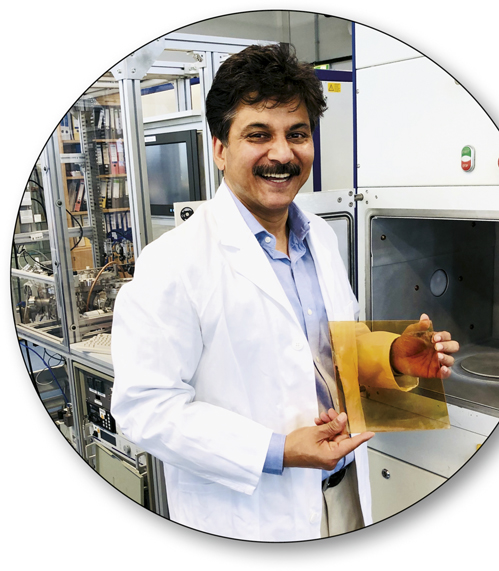Sanjay Mathur has an international presence. He is the director of the Institute of Inorganic Chemistry at the University of Cologne in Germany. Simultaneously, he is the co-director of the International Center for Renewable Energy Sources at Xi’an Jiaotong University, Xi’an, China, a World Class University Professor at Chonbuk University in Korea, and a Global Innovation in Research Professor at the Tokyo University of Agriculture and Technology, Japan.
“It is really a privilege to be so internationally connected. You cannot compare the feeling of having such global contacts to anything—no perks or any numerical parameters will even come close,” said Sanjay. It was his dream and passion to create a global network of materials for sustainability. After finishing his doctoral degree in chemistry in India, he went to Saarland University in Germany with a fellowship from the Alexander von Humboldt Foundation for advanced studies. Since then, he has been creating waves in the global ceramics and nanomaterials research community. “Personally, I think it is very important to convey to the next generation the immense role of international mobility and networks, as science cannot be done in silos,” he said.
Sanjay leads a group of materials chemists at the University of Cologne. Their research focuses on developing energy-efficient synthesis and processing of metal oxide nanostructures. The applications of nanomaterials are widespread; they are used in catalysis, energy harvesting, energy storage, and biomedical applications. The purpose of “our investigation is to find chemical pathways of synthesizing these nanostructures in the desired composition and form. We want to find out what recipe would be the best to generate nanomaterials with a high yield, while keeping the economics of efforts and costs of processing balanced. If the material yield is not high, then the process is wasteful,” explained Sanjay.
In Cologne, his research group works on nanostructured photocatalysts capable of splitting (sea) water to produce solar hydrogen as fuel. They also focus on the application of smart nanoparticles as transporters for targeted drug delivery and gene therapy, with the aim of early detection of chronic diseases.
When I asked him about how he got started with MRS, Sanjay replied, “I was a young faculty member, and like fellow materials scientists, extremely excited to attend the MRS Fall Meeting. Since the first one, I have attended at least one meeting every year in the past two decades. Sometimes I would even attend both the Spring and the Fall Meetings not only to maintain my transatlantic contacts, but also to feel the pulse of the frontiers of materials science. It is such a vibrant community, and seeing who’s who in the materials science world under one roof is fantastic for both learning and networking.”
“MRS has been my home, and I have found several friends, collaborators, and mentors through my association with MRS. This is one of the major reasons that I am a passionate MRS volunteer!” he added. Sanjay currently holds two volunteer positions with MRS: as part of the Broader Impact Program Development Working Group and as the chair of the Academic Affairs Committee (AAC). “I like that MRS is always willing to define new programs for recognizing its volunteers, which is one of the reasons that I agreed to chair the AAC.”

“Seventy percent of MRS members are young professionals, so it’s a top priority to cater to their needs and keep them engaged. Four subcommittees manage education and accreditation, international chapters, student engagement, and young professional engagement. So the aim is to work with my colleagues to make sure every aspect of professional needs and career growth is covered by our activities,” he said.
As for the Broader Impact Program, Sanjay explained that it is about going outside of the scientific domain to initiate dialogue between the scientific community and society. One of the main examples is outreach of science and its impact. “As you can imagine, this is a large discipline. My personal agenda is to make sure there is enough space for young people to grow into their responsibility of disseminating science, while at the same time making it easy for the experienced generations to get through the transformation,” he added.
One of his main achievements was establishing the MRS/E-MRS Joint International Chapter in Cologne. “It is the first international [MRS] chapter in Europe. The main challenge was convincing the European materials community that we won’t only have an outflow of talent, but also an inflow with the addition of the international MRS chapter,” explained Sanjay. Because of his extensive initiatives, he serves as the international ambassador at the University of Cologne, and now oversees many student-led events that cover scientific and societal topics.
“My personal passion and probably the reason I became a materials scientist has been to facilitate the transfer of materials technologies to the market. We founded some years ago a startup, Materials Alliance Cologne, which serves small- and medium-sized enterprises to innovate their technology portfolio. We also enable deployment of new technologies in other countries, such as India and Korea,” he added.
“Normally things you like come out of special or positive experiences,” said Sanjay. He loves spending time with his two sons. “I take them around and show them that you can benefit a lot from having a bicultural background both on personal and professional fronts. You see the world from many perspectives, and that is a powerful asset.”


